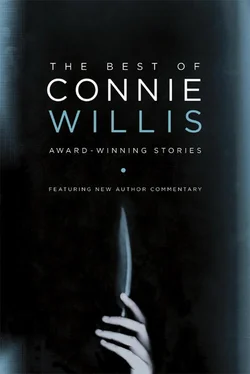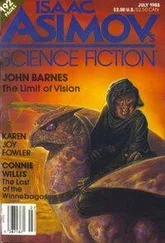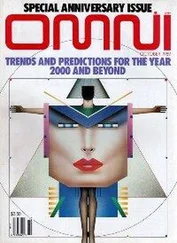me keep writing all these years:
—my long-suffering secretary Laura Lewis
—and my even more long-suffering family
—my miracle-working agents: Patrick Delahunt, Ralph Vicinanza, and Vince Gerardis
—my extremely patient editors Anne Groell
and Sheila Williams
and Gardner Dozois
—my EXTREMELY patient readers
—and my friends,
my fellow soldiers in the trenches,
who’ve kept me from getting discouraged
and more than once talked me out of quitting altogether.
All my best moments in science fiction I owe to you guys—
—staying up all night after that first Nebula Awards banquet with John Kessel and Jim Kelly,
eating chocolate chip cookies and red pistachio nuts
and getting red-stained hands that didn’t fade for weeks
—sitting in workshops with Ed Bryant
and Cynthia Felice
and Mike Toman
and George R.R. Martin
—driving to Portales to see Jack Williamson
with Charlie Brown
and Scott Edelman
and Walter Jon Williams
—gossiping with Nancy Kress
and Ellen Datlow
and Eileen Gunn
—laughing at something
Michael Cassutt
or Eileen Gunn
or Howard Waldrop said.
—laughing at something Gardner Dozois said so hard I snorted a piece of lettuce up my nose, nearly killing myself.
You guys are the wittiest, smartest, nicest people in the world, and I would not have lasted five minutes in science fiction without you.
But most important,
I need to thank
Robert Heinlein
and Louisa May Alcott
and Kit Reed
and Damon Runyon
and Sigrid Undset
and Theodore Sturgeon
and Agatha Christie
and Jerome K. Jerome
and Daphne du Maurier
and Philip K. Dick
and Rumer Godden
and L. M. Montgomery
and Ray Bradbury
and Shirley Jackson
and Bob Shaw
and James Herriot
and Mildred Clingerman
and P. G. Wodehouse
and Dorothy L. Sayers
and Daniel Keyes
and J. R. R. Tolkien
and Judith Merril
and Charles Williams
and William Shakespeare.
Which brings me to the subject of this speech.
You’re supposed to talk about something significant in a guest-of-honor speech—
global warming
or the coming Singularity
or space travel
or tougher sentences for parole violators.
Or world peace.
But I want to talk about something completely personal.
I want to talk about books and what they have meant to me.
Which is everything in the world.
I owe books my vocation, my life, even my family.
I’m not kidding.
You probably don’t know this, but I only got married because of a book.
And, no, I’m not talking about love poems.
And, NO, not Lolita .
I got married because of Lord of the Rings .
To quote Kip Russell in Have Space Suit, Will Travel , “How it happened was this way.”
I was flying out to Connecticut
for the express purpose of breaking up with my boyfriend
and I bought this set of three paperbacks to read on the plane
and by the time I got to New Haven
I was so worried about Frodo and Sam
that I said to my boyfriend, “It’s awful. They’re trying to sneak into
Mordor and the Ringwraiths are after them and I don’t trust Gollum and…”
and I completely forgot to break up with him.
And, as of yesterday, we’ve been married thirty-nine years.
I owe my daughter’s name to a book, too. We named her after the good daughter in King Lear
and she has lived up to her name in absolutely every way.
And I owe all the books I’ve written to books.
They taught me how to write.
Agatha Christie taught me plotting
Mary Stewart suspense
Heinlein dialogue
P. G. Wodehouse comedy
Shakespeare irony
and Philip K. Dick how to pull the rug out from under the reader.
Books also gave me all sorts of good advice on how to cope with everything,
from following the rules—
“There are three rules for writing a novel,” W. Somerset Maugham said. “Unfortunately, no one knows what they are.”
to the stupid questions people ask writers—
Heavens! [Harriet Vane thought.] Here was that awful woman, Muriel Campshott, coming up to claim acquaintance. Campshott had always simpered. She still simpered… She was going to say, “How do you think of all your plots?” She did say it. Curse the woman .
to coping with the pressure to write what your publisher—or your readers—want—
“The only thing you can do,” Dorothy Sayers said, “is write what you want to write and hope for the best.”
to feeling like you’ve made a hideous mistake in your choice of career—
“It took me fifteen years to discover I had no talent for writing,”
Robert Benchley told me, “but I couldn’t give it up because by that time I was famous.”
They even showed me what to write and how to write it.
When I went to England for the first time,
I remembered that book about the Blitz Mrs. Werner had read out
loud when I was in the eighth grade,
and it made me go to St. Paul’s,
where I found the fire watch and Oxford’s time-traveling historians
and my life’s work.
Above all, they taught me what it meant to be a writer.
“Storytellers make us remember what mankind would have been like had not fear, and the failing will, and the laws of nature tripped up its heels,” William Butler Yeats said.
And books—
Wait, I’m getting ahead of myself.
Let me begin at the beginning.
I loved books from the moment I saw them, from before I could even read.
And as soon as I did learn,
I read everything I could get my grubby little hands on.
You couldn’t get a library card till you were eight years old when I was a kid
(These were dark, benighted times)
and you were only allowed to check out three at a time
(Really dark and benighted times).
So the day I got my library card,
I checked out three of L. Frank Baum’s Oz books.
Rita Mae Brown says, “When I got my library card, that’s when my life began.”
Mine, too.
I read all three Oz books that night
and took them back the next day
and checked out three more.
And then I checked out all the other Oz books
and all the Maida’s Little Shop books
and all the Elsie Dinsmore books—
possibly the worst books ever written—
and all the Betsy, Tacy, and Tib books
and the Blue, Green, Yellow, Red, and Violet fairy books.
No one else in my family liked to read,
and they were always telling me to “get my nose out of that book
and go outside to play,”
an order which had no apparent effect on me
because I went right ahead and read
all the Anne of Green Gables books
and all the Nancy Drew books
and all the Mushroom Planet books
and Alice in Wonderland
and A Little Princess
and Cress Delahanty
and The Water Babies .
When I was in sixth grade,
I read Little Women
and decided I wanted to be a writer like Jo March.
When I was in seventh grade,
I read A Tree Grows in Brooklyn
and decided to read my way straight through the library from A to Z
like Francie does in that book.
When I was in eighth grade,
my teacher Mrs. Werner read us
An Episode of Sparrows by Rumer Godden, a book about an orphan who plants a garden in the bombed-out rubble of a church, and I fell in love with the Blitz.
Читать дальше












